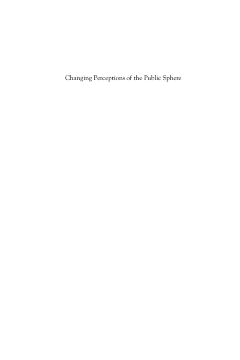
Additional Information
Book Details
Abstract
Initially propounded by the philosopher Jürgen Habermas in 1962 in order to describe the realm of social discourse between the state on one hand, and the private sphere of the market and the family on the other, the concept of a bourgeois public sphere quickly became a central point of reference in the humanities and social sciences. This volume reassesses the validity and reach of Habermas’s concept beyond political theory by exploring concrete literary and cultural manifestations in early modern and modern Europe. The contributors ask whether, and in what forms, a social formation that rightfully can be called the “public sphere” really existed at particular historical junctures, and consider the senses in which the “public sphere” should rather be replaced by a multitude of interacting cultural and social “publics.” This volume offers insights into the current status of the “public sphere” within the disciplinary formation of the humanities and social sciences at the beginning of the twenty-first century.
David Midgley is Reader in German Literature and Culture at the University of Cambridge, England, and a Fellow of St. John’s College.
“The eight well-edited essays selected by Christian J. Emden and David Midgley create a good balance between critical and consenting perspectives on Juergen Habermas’ idea of the public sphere… this anthology is not only complementary to Habermas’ model (by taking, for instance, earlier developments into consideration, as Habermas did) but also expands on it, by discussing his work in the light of the critiques that have been levied against it. As a result, this very interesting volume pays respect to the merits of his model, but also to the need to remodel it.” · European Review of History/Revue Europèenne d'Histoire
"An impressive collection of essays with contributions from a stellar cast, including leading authorities from a variety of disciplines, notably cultural, intellectual and literary history... nicely balanced, [the volume] does justice to the richness and complexity of Habermas’s ideas and offers fresh perspectives on its heuristic uses.” · Martin A. Ruehl, Cambridge University
Christian J. Emden is Associate Professor of German Intellectual History and Political Thought at Rice University.
